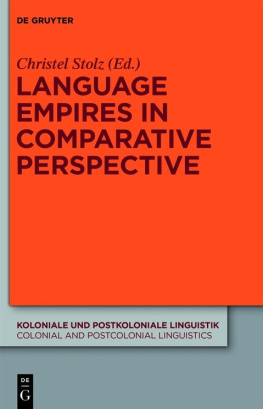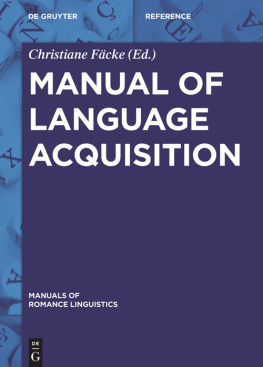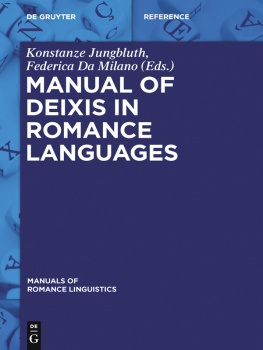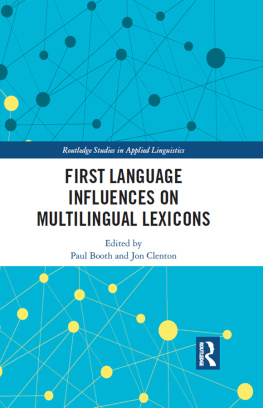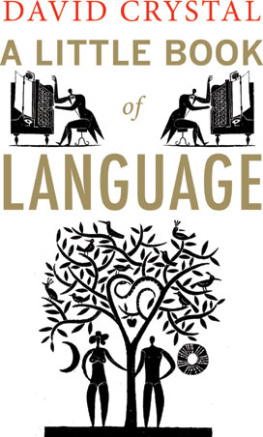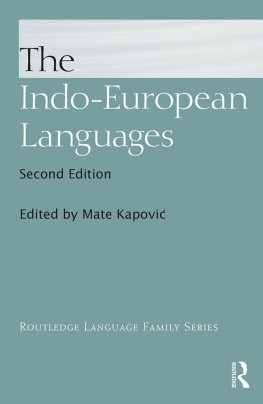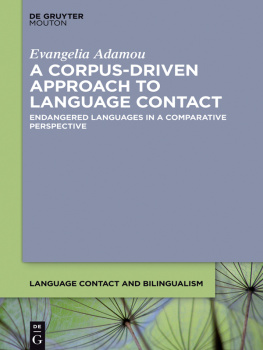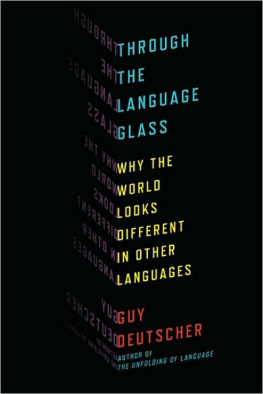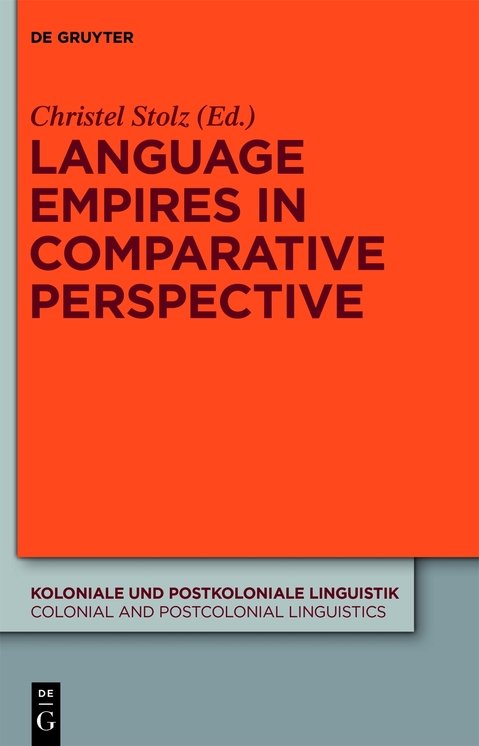Literature
Achard, Pierre. 1988. The development of language empires. In Ulrich Ammon, Norbert Dittmar & Klaus Mattheier (eds.), Sociolinguistics Soziolinguistik. An international handbook of the science of language and society, 1541 1551. Berlin/New York: de Gruyter.
De Swaan, Abram. 2001. Words of the world. The global language system . Cambridge: Polity Press.
Fishman, Joshua. 1967. Bilingualism with and without diglossia; diglossia with and without bilingualism. Journal of Social Issues 23(2). 2938.
Fishman, Joshua. 1991. Reversing language shift . Clevedon: Multilingual Matters.
Hamel, Rainer Enrique. 2006a. Sprachimperien, Sprachimperialismus und die Zukunft der Sprachenvielfalt. Vortragsreihe Die Macht der Sprache . Goethe-Institut, Ludwig-Maximilians-Universitt Mnchen.
Hamel, Rainer Enrique. 2006b. The development of language empires Entwicklung von Sprachimperien. In Ulrich Ammon, Norbert Dittmar & Klaus Mattheier (eds.), Sociolinguistics Soziolinguistik. An international handbook of the science of language and society . Berlin/New York: de Gruyter.
Ostler, Nicholas. 2006. Empires of the word: A language history of the world . New York: Harper Perennial.
Philippson, Robert. 1997. Realities and myths of linguistic imperialism. Journal of Multilingual and Multicultural Development 18(3). 238247.
Mohand Tilmatine
Arabization and linguistic domination: Berber and Arabic in the North of Africa
Abstract: Due to Arab territorial expansion in the Middle Ages and the diffusion of Islam and the Quran, Arabic spread across all North Africa. After the North African countries became independent in the twentieth century, the ideological choices of these countries led to a policy of Arabization of the Berberophones of Morocco, Algeria and Libya. While those of Tunisia have practically disappeared, the surviving Amazigh populations try to resist and save their language by claiming linguistic rights. In addition, the absolute domination of Arabic, as it was previously the case of French, as a language of bread (Native Language) inculcated/instilled in speakers of indigenous languages is typically reflected in this kind of situation: the hate of oneself and linguistic alienation. As a result of the ideological choices made after independence, repressive laws were passed to force Arabization upon local populations and to break their resistance. The law on Arabization in Algeria illustrates perfectly this linguistic policy of repression and constitutes therefore the object of this contribution and a case study in this sense.
Keywords: Berber, Arabization, North Africa, Algeria, identity
Mohand Tilmatine: Facultad de Filosofa y Letras, Departamento de Filologa, Estudios Amaziges (Bereberes), Universidad de Cdiz, Avda. Dr. Gomez Ulla, s/n, 11003 Cdiz, SPAIN, mohand.tilmatine@uca.es
1 Introduction
Speaking about linguistic empires implies the existence of these empires and the role of language in their processes of territorial, economic and political expansion, but also the degree to which these empires used or use language as an instrument of power. The aim of this presentation is to take advantage of the theoretical debate about the role of powerful imperial languages in order to see if the observations or conclusions made for a language such as English or French can also be applied to other cases, generally less discussed.
On this basis, this contribution will put into perspective a much less equal linguistic conflict than that of English and French, namely the conflict between Arabic and Berber.
1) In the case of Arabic and Berber, we are not speaking about a confrontation between two international languages of more or less equal value, but about a dominant, imperial language, Arabic. On the one hand, Arabic as a dominant language and on the other hand, Berber as a minoritized and subdominant language. This situation can be described according to Swaan and Calvets Gravitational system (Swaan 1993, Calvet 1999) or it can be analyzed as one of the two strongest trends characterizing current global linguistic dynamics: the displacement of minority languages and the expansion of English as the sole world language (Hamel 2010).
2) Nevertheless, it seems that the several existing classifications do not perfectly correspond to the situation of Arabic and its relations with Berber in North Africa. In the best case, Arabic may be considered a language of rank 2, a super central language in the schema proposed by Hamel (2010: 6) and identified as such in Swaan (1993: 220), even if the definition (and the criteria of circles in extension) are not valid for Arabic. Berber, is also difficult to insert into the proposed schema.
From the point of view of its status and its social function, it may correspond to a vernacular local language of rank 6 in certain countries, but also to the category of secondary central national language in the fourth group in Hamels schema. Taking forward the idea expressed by Hamel (2006b: 2247), it may be taken as symptomatic of the field that the authors of these theories writing about languages across the globe do so without taking into proper account such situations as those of Arabic or Berber.
In fact it is not possible to say that Arabic and Berber have a gravitational relationship because a language of a lower level Berber in the present case gravitates around a language on the higher level Arabic (Hamel 2006b: 2250). This is because the authors do not specify which Arabic they are speaking about: the classical or the dialectal. If it is not classical Arabic, then which dialect among the numerous variants which exist in the so-called Arab countries is being considered? Furthermore, if two Berber speakers meet, one a native of the northern littoral and the other one from further south, for example, and find it difficult to communicate in Berber, they will generally resort to the Arabic dialect, or even to another super central language such as French to communicate, but practically never to Classical Arabic. Both Arabic and Berber have a certain relationship as a majority and dominant language vs. a minority and dominated language, but both also have independent lives and historic evolutions.
However, the difficulty in figuring out the situation of both languages, Arabic and Berber, does not constitute the only difference with languages such as French and English. Speaking about Arabic and the empire created by the Muslims in the medieval period in comparison to modern colonial empires, certain divergences seem obvious.
3) First of all, a successful and massive spreading of the European colonial languages took place together with a massive emigration policy in the colonies and the extermination of their original populations. This happened foremost in the Americas where several countries were heavily settled by Europeans like the USA, Canada, Uruguay, Argentina, Brazil, Chile, Colombia, Venezuela, Costa Rica, Nicaragua and the Spanish Caribbean. Paraguay is considered to be the only country in the Americas which developed a collective bilingualism (Spanish and Guarani) (Hamel 2006a: 22). Contrary to this example, the extension of Arabic did not occur following massive emigration movements of native populations coming from the Arabian Peninsula towards North Africa.
4) In contrast to the main known historical case (the Roman Empire and the Latin language), Arabization occurred with Arabic as the vehicle of a vast and fast campaign of Islamization. A very important difference between the situation of the so called hypercentral or super central languages such as English or French lies in the fact that the expansion of Arabic based itself fundamentally on the religion. This last point can be used as focus in this analysis and constitutes the basis of the Arabic domination in North Africa. This domination, which begins with the arrival of the Arabs and the Islamization of North Africa in the seventh century continued to present times by leaning on two fundamental pillars: on the one hand, Islamic legitimacy which fed off the inextricable relationship between Islam and Arabic, and on the other hand, nationalist legitimacy.

